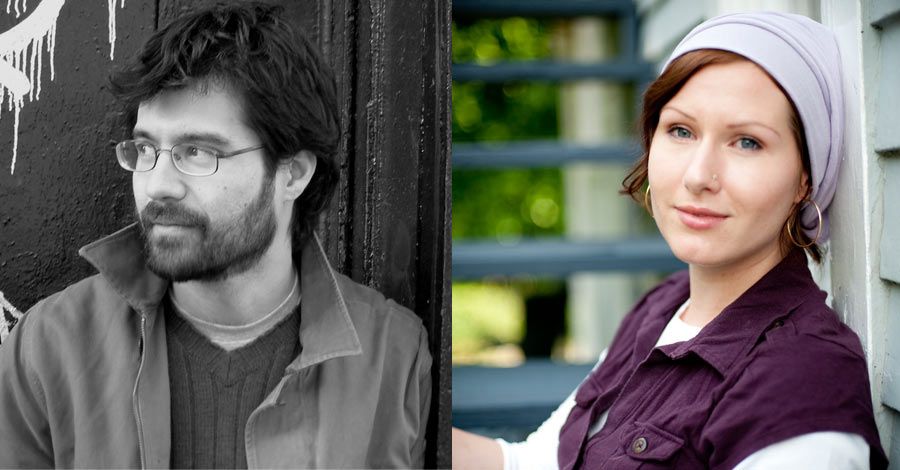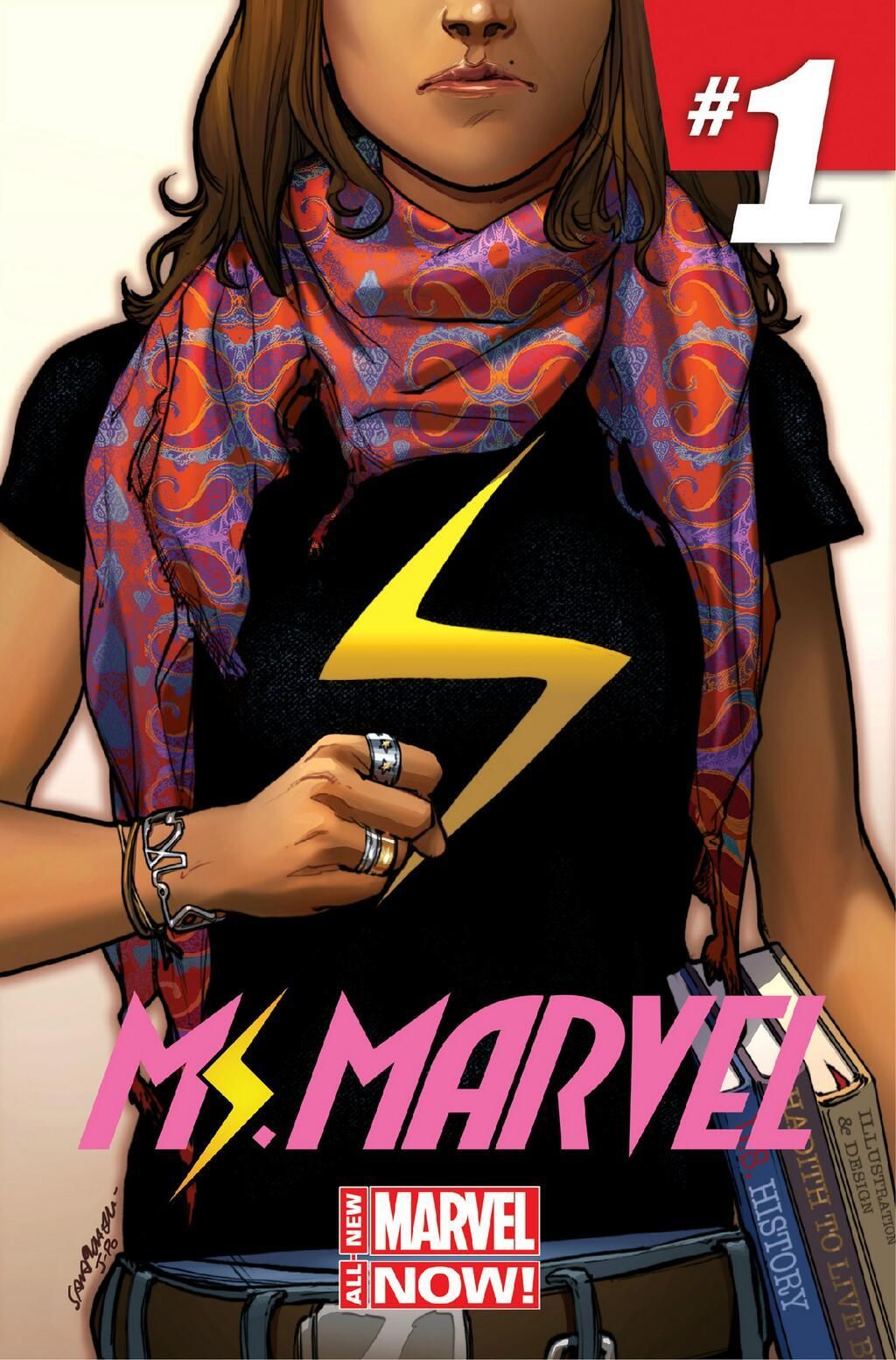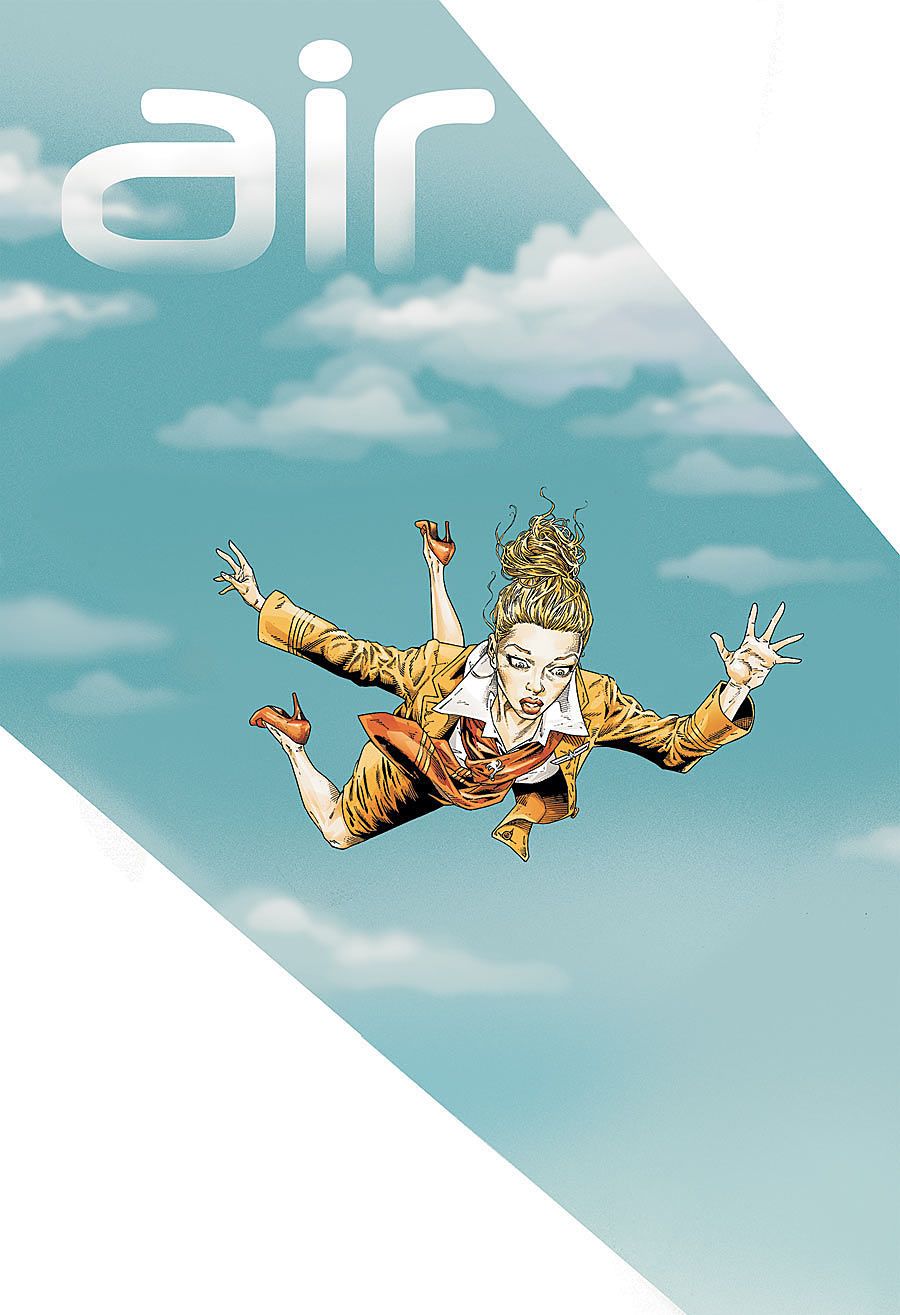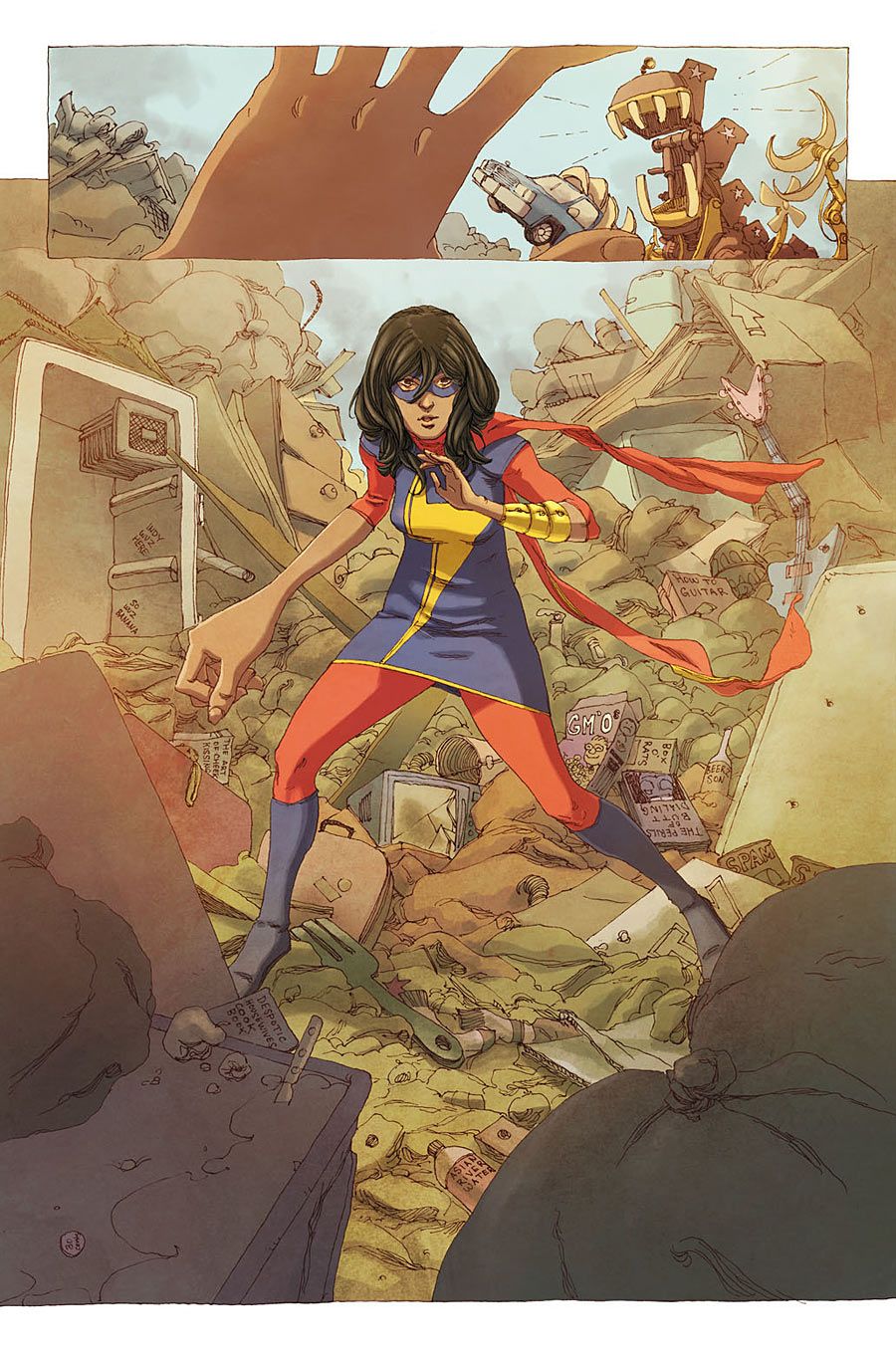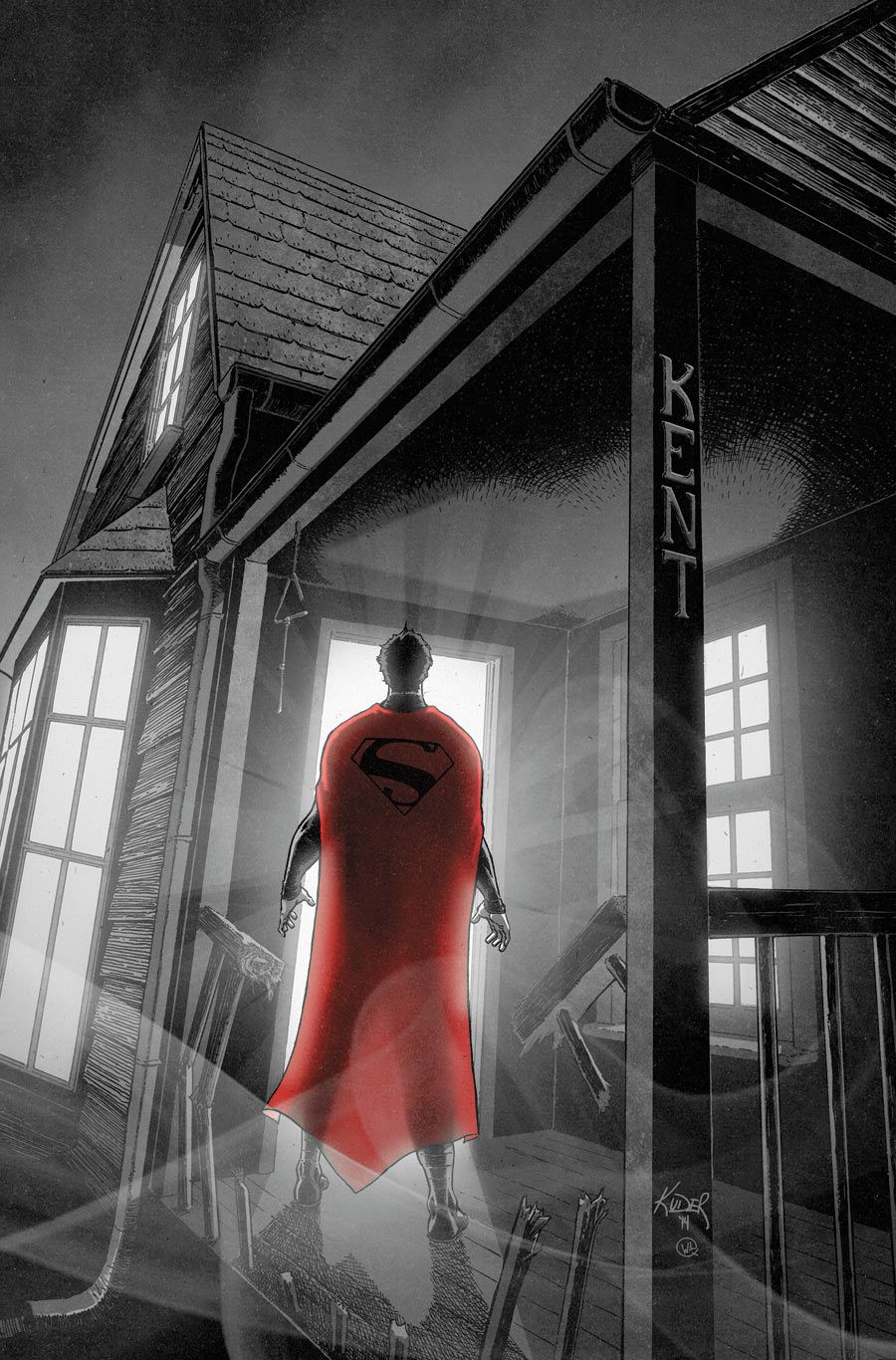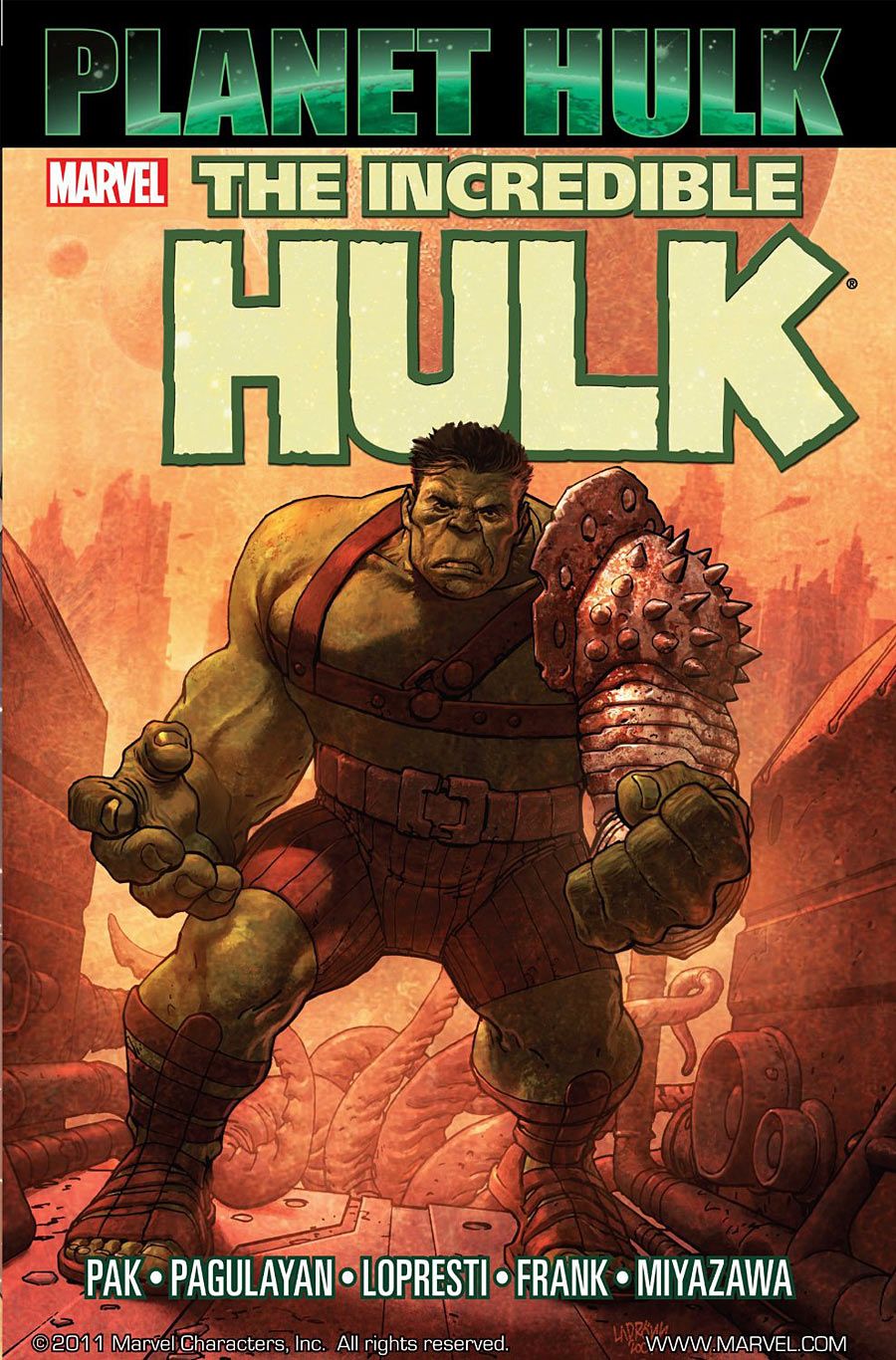On Saturday at New York Comic Con, Nerdist Comics Panel hosts Ben Blacker ("Thrilling Adventure Hour," "Thunderbolts") and Heath Corson (writer, "Justice League: Throne of Atlantis") presented Greg Pak and G. Willow Wilson. Pak has thrilled fans with "Planet Hulk" and "World War Hulk" for Marvel, as well as the much missed cult favorite "The Incredible Hercules" co-written by Fred Van Lente. He is currently writing "Action Comics" for DC Comics, "Storm" for Marvel and "Turok: Dinosaur Hunter" for Dynamite Comics. Wilson writes one of Marvel's most beloved new series, "Ms. Marvel," the story of teenage American Muslim trying to prove herself as a super hero the Marvel Universe. Wilson has also written "Air" for Vertigo Comics and brings a truly unique perspective to bring to the world of mainstream super heroes. Blacker and Corson had the questions, Wilson and Pak had the answered as fans at New York Comic Con were treated to a master's class on the writing process.
The first questions asked the panelists how they decide where to go story-wise when they are working on major franchises and how they serve the story they want to tell while also serving 50-75 years worth of history with certain characters.
"The first time you start to do it you freak out a little bit, it feels like you're walking in the footsteps of giants," Pak answered. "But everybody who works on these books feels the same way -- that's the nature of comics, they are constantly changing, but they will eventually return to form. In order for serial entertainment like this to work, it had to change, and whatever you're doing someone probably did thirty, forty, fifty years ago. I was not the first person to shoot Hulk onto an alien planet. You just embrace the opportunity and have fun and put your heart into it."
After Pak's thoughts, Blacker proclaimed his love for "Ms. Marvel" and complimented the Wilson by comparing her new character, Kamala Khan, to a true Marvel classic. Blacker said reading "Ms. Marvel" hits the same strings as early Spider-Man issues and asked Wilson how she achieved that.
"I think with 'Ms. Marvel,' we actually had an opposite scenario," Wilson said. "The expectation was so low that all we could do was hit it out of the park. Any time you take on a legacy title like 'Ms. Marvel' with a new character there's going to be some friction. People will say, 'What was wrong with the old one?' and what about this and what about that. We were given the freedom to tell the story we wanted to tell, so we were able to make it very authentic and a little bit off beat and get into this world that Kamala inhabits. There's something to be said for that, to be the dark horse.
"When I was having early conversions with Sana Amanat the editor, we were saying, 'If we can get the book to ten issues, that would be great,'" Wilson continued. "We know what we were up against and I just finished issue #11, so we did it."
Pak then thanked Wilson for making "Ms. Marvel" a success, because without Wilson's book the solo "Storm" title he recently launched would never have been greenlit by Marvel. "There are so many people in these companies who want to do the books you want to read, specifically in this case books with strong, diverse casts. And also bring in differ kinds of artists," Pak said of the desire for more diverse books. "When you guys buy those books, these things will happen.
CBR TV: G. Willow Wilson Taps Into the Zeitgeist with "Ms. Marvel"
Corson then asked Wilson to talk a little about the process of pitching "Ms. Marvel."
"This is how it happened. I had not done anything comics related in about a year. I was working on 'Alif the Unseen,' which was my novel, and I get this call out of the blue from Steve Wacker and Sana Amanat at Marvel and they say they want to do a young, female, America Muslim super hero and I say, 'You guys are crazy!' I would never pitch that in a million years because I value my career, but they were serious. I was really impressed because usually that stuff, that math changing stuff, does not get pushed through. To have them come to me and want to do this thing... It had to be done exactly right. Everyone is going to be looking. Sana and I did months and months of research getting the details of her background, her family, what she likes, who she is. We got a little bit meta with it. She's growing up in a world where she would have seen Thor and she would have seen Captain Marvel saving Manhattan. We really wanted to make her as real as possible. Again, because we didn't know this was going to be a thing, we were left alone to do that, which was awesome."
Blacker then turned to audience questions, but the first fan at the podium wanted only to offer thanks. The Pakistani woman dressed in a Ms. Marvel costume told Wilson and the panel what Kamala meant to her. "I am Pakistani America Muslim," the woman said as she started to cry, "born and raised here and I appreciate everything you have done for us. We have not had a voice for so long and in every arena of geek culture, we are present but silent, and I thank you for giving us this opportunity and also for being so unapologetic in your portrayal of your culture and our lives and I am so glad white boys are asking me to translate something other than 'Temple of Doom.'"
Blacker followed that moment by noting that in both "Ms. Marvel" and "Air," Wilson is presenting cultures that many aren't familiar with. He asked the writer how that information best serves her stories.
"I think you have it come up as it would naturally. I kind of think how Kamala would go through her day from start to finish. Where would those beats naturally fall? If she's home on a Friday night like in the first issue, she wants to get her homework out of the way and she's writing fan fiction," said Wilson. "I just picked these moments that would be familiar with any background and showed how they would play out within Kamala's world with her parents, with her family. For me it was trying to take a naturalistic approach and not try to crowbar it in."
Corson followed that by asking Pak how he broke into comics.
"I came to New York in 1993 to go to film school" Pak said. "I went to NYU through the grant program, made a couple of short films and then made a feature film called 'Robot Stories.' I got an agent and my agent told me Marvel was poking around to see if there were any independent film people who wanted to work on comics. I wrote two or three scripts that got green lit and then got pulled back for various reasons.
"I wrote a whole script for 'Strikeforce Morituri' which was awesome," Pak continued. "It was a reimagining of 'Strikeforce Morituri' like the new 'Battlestar Galactica.' They loved it, I had an amazing experience with Dan Buckley, he told me how much he loved the script, but it didn't happen for various reasons. He assured me it had nothing to do with my writing and I trusted him on that. I was just out of film school, so I just kept developing because I was working a lot -- eventually I did 'Warlock' and then I did 'X-Men: Phoenix Endsong,' and that's when I knew I had a career when they called me and told me I got the 'X-Men' book."
That question was followed up with Blacker asking the panelists if their writing had ever surprised them.
"You know generally what the big story is, and you figure it out as best you can. Then when you're actually writing, you always discover new things," Pak said. "That's the joy of it. You figure out some little detail and you see it's the key to what you're trying to do. Also, sometimes, you figure out the thing you were going to do, in the end you may end up doing exactly that but you find a deeper nuance -- I've never changed an ending because the fans didn't like an ending. The story has to go there, but my understanding of something deepens. Like when I was doing 'Hulk,' I figured that hero monster thing about an issue or two in. I was doing that but I didn't know I was doing that, the depth of your knowledge changes. In 'World War Hulk,' I really wanted to do Thor versus Hulk, but suddenly Thor was gone and I had to use Sentry instead, which was fine because I found the emotional reason the Sentry could resonate."
The next fan wanted to know difficult it is to have a beloved character do something awful.
"It's a big thing, because in order for a character to grow or change, they have to make mistakes," Wilson said. "That's what everybody does, that's how we learn. I thought about that a lot with how I would portray violence in 'Ms. Marvel' because she's not a violent character, she doesn't like violence, which is not great if you want to be a super hero -- I think you have to figure that out. To me it's helpful that if I have that reaction the character will have that reaction; if it's something I'm worried about then it's something the character is worried about."
Pak Creates a Chaotic "Storm" with the Death of Wolverine
The next fan thanked the panelists for all their words and hard work and asked if there was anything Pak and Wilson do during their process that helps them get into the mind of the characters, "like listen to speed metal when writing 'Hulk?'"
"I didn't say this, and I forgot who did. All art is autobiographical. I think that's true," Wilson said. "You always find the thread that is common between you and the character and pull on that. Often, if the character that has the most to teach is the most different from you, it will have a universality because that will resonate with the reader as well. I try to remember that, when I do something like Superman or have a different set of life experiences, I ask what about that character speaks to me. Where do I tear up when I hear their story, what makes me angry, and I pull on that."
"With Superman it's like, he's an alien, but really deep down he's a kid that grew up in Smallville, Kansas and realized he has power and responsibility," Pak added. "I'm a half Korean kid that grew up in Dallas, it all resonates with me. I moved to New York and Superman moved to Metropolis. I mean Storm, I was never a child of an African princess or an African American photographer' my parents never were killed in a terrorist attack and I never grew up on the streets of Cairo. She's a person who has responsibilities to multiple communities, to a whole lot of different people, and is a multicultural, bicultural person, and all that resonates with me deeply."
Blacker ended the panel by asking each writer what they were currently reading and what books get them excited.
'Captain Marvel,' 'She-Hulk,' 'Pretty Deadly,' 'Saga,'" said Wilson.
"All those, plus 'Wytches' by Scott Snyder is very, very scary and creepy," added Pak. "Fred Van Lente has a new book called 'The Resurrectionists' coming out."

